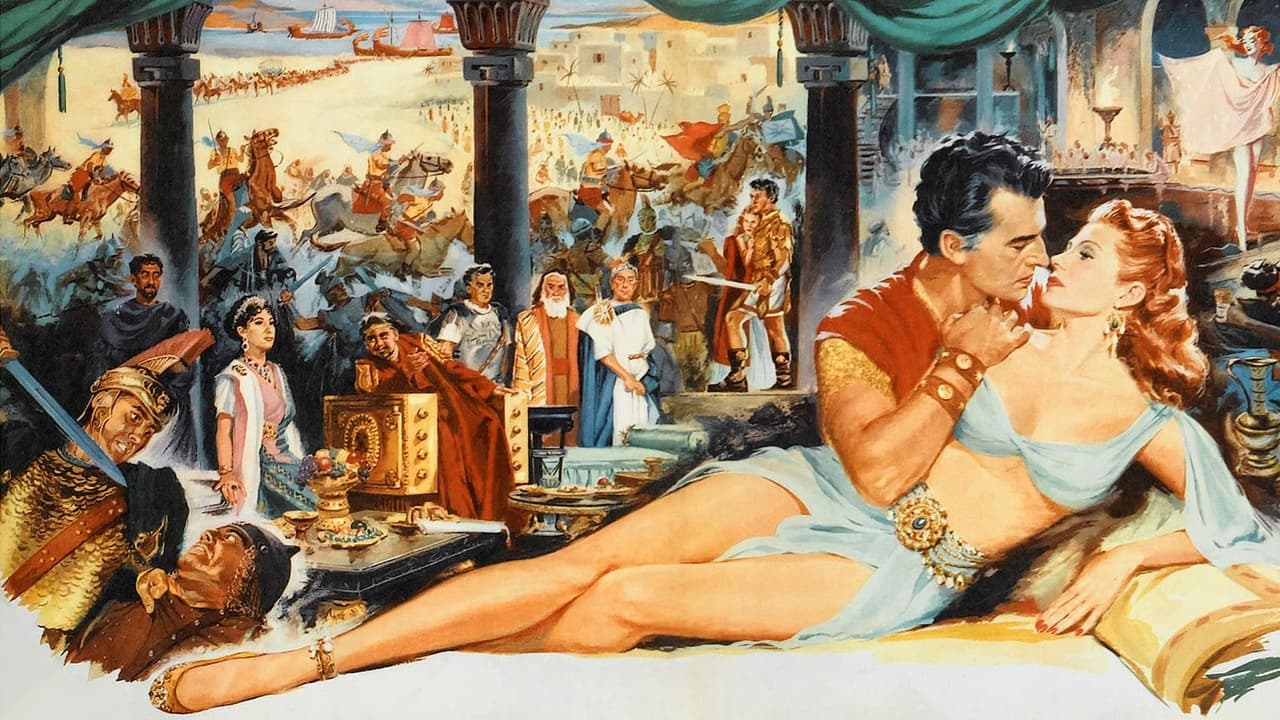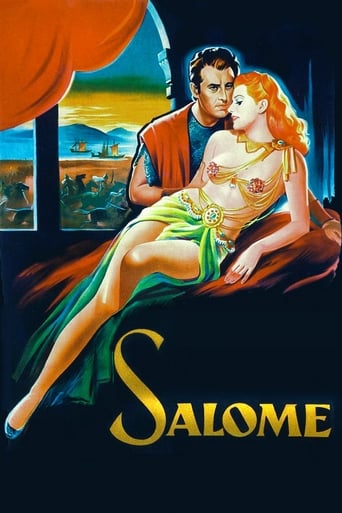

Why so much hype?
... View MoreThe greatest movie ever made..!
... View MoreGreat Film overall
... View MoreMostly, the movie is committed to the value of a good time.
... View MoreHad the director credit read Ed Wood and not, as it does, William Dieterle, I would have thought it one of Wood's worst efforts. How anyone involved would want to include this debacle on their CV is beyond me. In its favour we do get some film buffs treasures; Basil Sydney, looking as though he wandered onto the wrong soundstage while shooting Hamlet and wondering why he is suddenly in the wrong costume; Cedric Hardwicke, slightly aloof and apart, as if he is being filmed against the blue background that wasn't available at the time; a pair of gorgeous hams in Charles Laughton and Judith Anderson, chewing not only the scenery on their own set but also that on adjacent sound stages, and, of course, Stewart Granger, supercilious as ever, barely managing to conceal his built-in arrogance. This leaves Rita, alone, isolated, getting no help whatsoever from the rest of the cast, still managing to shine and glow in a meaningless cause.
... View MoreQuite a complicated and interesting drama, based on the well known, but previously much altered and embellished brief biblical story of Salome(unnamed in the bible): daughter of Herodias and stepdaughter of Herod Antipas: ruler of Galilee, and the involvement of these 3 in the dramatic serving of John the Baptist's head at a lavish birthday banquet hosted by Herod.In this version, we have two scorned women in Salome(Rita Hayworth) and Herodias(Judith Anderson). These events occur early in the film. First, there is a report that the Jewish prophet John the Baptist has returned from the wilderness. He has been criticizing the (clearly loveless) marriage of Herodias and Herod as defying Jewish law, Herodias being the former wife of Herod's brother, who is Salome's biological father. Herodias petitions Herod(Charles Laughton) to have this busybody crank put to death. But Herod fears he may be the rumored messiah, and that his death by his edict might cause bad things to happen and the common people to riot against him. Fortunately, for Herod, John has also been preaching things treasonous to Rome. Thus, he has other pretexts to jail, if not execute, him. This doesn't happen until late in the story. Meanwhile, in a completely novel embellishment of the story, we find Salome having lived in Rome most of her life, as a spoiled princess. Now, Marcellus, cousin of the emperor asks permission to marry her. The emperor refuses, because Salome is not of royal Roman blood. Furthermore, he banishes her back to Galilee, charged with being a barbarian and woman of ill-repute. After failing to convince Marcellus to renounce his Roman citizenship, she boards a ship also carrying the newly appointed governor of neighboring Judea: an unimpressive Pontius Pilot(P.P.). Also prominent is P.P.'s new commander of the occupying army: impressive Claudius(Stewart Granger), who has 5 years diplomatic experience in Galilee, and is a friend of John the Baptist(however unlikely!), as well as a previous comrade in battle with P.P. They talk about their old times fighting the Britains(which historically didn't happen until several decades later!). P.P. tells Claudius to get Salome out of his quarters on the ship. But Claudius is cowed by her tongue lashing about all Romans, whom she doesn't want to see or speak to for the rest of the journey. But, later he surprisingly steals a kiss when she asks for water for a bath, and continues to confidently tease her arrogance during their overland journey to Galilee.During this journey, John and followers are encountered. Alan Badel, as John, is presented as an upward-gazing mystic, looking like a popular painting of Christ, with piercing blue eyes, in marked contrast to the clean-shaven Romans. But John refuses to heed Claudius's advice not to preach in the cities, nor bad mouth the Romans. Hence, John is later arrested. His riveting exchanges with Herod and his council is one of the highlights of the film. He disclaims being the Messiah, but says he is loyal to an unseen God mightier than any earthly king. Herod has prearranged with Salome to jail John, rather than put him to death, as his ministers, Herodias, and P.P. wish.Meanwhile, Claudius has gone to see P.P. to try to convince him to support, rather than persecute, what Claudius sees as an emerging new religion that will bring peace and prosperity to the Roman world. Suggests P.P. may become famous(rather than infamous) by doing so. But, P.P. disagrees, ordering Claudius to stay out of Galilee until he can be deported back to Rome. P.P. happens to mention a carpenter in his realm, who is claimed to perform miracles. Claudius goes looking for him and witnesses some of his miracles. Disobeying P.P., he returns to visit John and Salome in John's cell, to tell them about Jesus, whom John claims is the messiah.Claudius and Salome then scheme to release John. Claudius is head of the palace guard, so tells them to release John. But Salome says she will dance at Herod's banquet that evening, and ask for John's release. Salome does the 'dance of the 7 veils'. But, strangely, Herod does what Herodias, not Salome, asks! Apparently, Herod agreed to her request for John's head, with the understanding that she then agreed to his attempted seduction of Salome! After wrestling John away from Claudius, Herod's soldiers behead John and deliver it on a platter. I can still hear Rita scream! The film ends with Claudius and Rita attending Christ's Sermon on the Mount. Thus, they symbolize the beginning of the eventual conversion of most of the Roman world to this new religion.I thought Stewart Granger did an excellent job in his unlikely role as the first important Roman to embrace this new religion, dragging Salome along. This theme would be revisited, more dramatically, the following year, in "The Robe". Laughton also did an excellent job as the severely conflicted Herod, as intent on seducing Salome as in preserving the life of John, with ultimate failure on both counts. Rita is also interesting as an unconventional over-aged seductive version of the traditionally teen Salome, with a mind of her own and care about her virtue. Judith's Herodias is to be pitied as the virtually discarded wife of Herod, transferring much of her anger to John.
... View MoreThe things that you're liable to read in the bible it ain't necessarily so.Does anyone really believe what it says in the bible?And for that matter who cares?Films are made as entertainment,not documentaries of fact So Rita Hayworth is past her best,but 10th rate Rita is better than first rate any actress can achieve today.The film is worth watching as a colourful spectacle,especially the dance of the seven veils.What Jean Louis can do with a few saris and a few thousand yards of silk deserves an Oscar.
... View MoreChocked full of biblical inaccuracies, this fun free for all lasts for hours and hours. People complain that films are too long today, but those who do the complaining obviously have no idea that these older films even exist. Guess they also never heard of Gone with the Wind or To Kill a Mockingbird, either. LOLAnyway, Rita Hayworth is beautiful in her part as Salome. She's quite possibly the most beautiful Salome ever, though the ambiguity of her character herein is a bit annoying, and the direction taken by this version of the biblical story is a bit odd, but the overall production is fun, nonetheless, though entirely frivolous.All in all? It's entertaining and historically accurate, if not biblically so, which is so often the case.It rates a 7.3/10 from......the Fiend :.
... View More